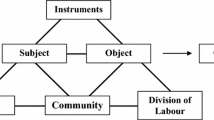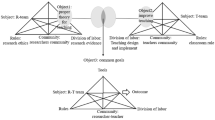Abstract
In this forum we discuss three aspects designed to clarify and extend Kelly and Kassing’s paper. These are the roles of improvable objects, contradiction and object/tool reciprocity. In each case we cite relevant literature and pose questions to the field. Our goal is to seed ideas for future discussions concerning the role of activity theory in our current and future research in informal learning settings.
Similar content being viewed by others
References
Ash, D., & Lombana, J. (2012). Methodologies for reflective practice and museum educator research: The role of ‘noticing’ and responding. In D. Ash, J. Rahm, & L. Melber (Eds.), Putting theory into practice: Methodologies for informal learning research. Rotterdam: Sense Publishers.
Ash, D., & Sherman Gardiner, J. (2013). Blue shirt, purple shirt: the role of contradiction in expansive learning in a museum. Manuscript in preparation.
Bereiter, C. (1994). Implications of postmodernism for science, or, science as progressive discourse. Educational Psychologist, 29, 3–12.
Engeström, Y. (1987). Learning by expanding: an activity-theoretical approach to developmental research. Helsinki: Orienta-Konsultit.
Engeström, Y. (1996). Interobjectivity, ideality, and dialectics. Mind, Culture, and Activity, 3, 259–265. doi:10.1207/s15327884mca0304_5.
Engeström, Y. (1999). Innovative learning in work teams: Analyzing cycles of knowledge creation in practice. In Y. Engeström, R. Miettinen, & R.-L. Punamaki (Eds.), Perspectives on activity theory (pp. 377–404). Cambridge: Cambridge University Press.
Engeström, Y. (2001). Expansive learning at work: Toward an activity theoretical reconceptualization. Journal of Education and Work, 14, 133–156. doi:10.1080/13639080020028747.
Ferguson, R., Whitelock, D., & Littleton, K. (2010). Improvable objects and attached dialogue: new literacy practices employed by learners to build knowledge together in asynchronous settings. Digital Culture & Education 2, 103–123. Retrieved from http://www.digitalcultureandeducation.com/uncategorized/furguson_html_2010/.
Foot, K. (2002). Pursuing an evolving object: A case study in object formation and identification. Mind, Culture and Activity, 9, 132–149.
Lave, J. (1991). Situating learning in communities of practice. In L. Resnick, J. Levine, & S. Teasley (Eds.), Perspectives on socially shared cognition (pp. 63–82). Washington, DC: APA.
Nardi, B. (1992). Studying context: a comparison of activity theory, situated action models and distributed cognition. Proceedings East-West Conference on Human-Computer Interaction. August 4–8, St. Petersburg, Russia. pp. 352–359.
Vygotsky, L. S. (1978). Mind in society. Cambridge, MA: Harvard University Press.
Wells, G. (1999). Dialogic inquiry: Towards a sociocultural practice and theory of education (pp. 313–334). Cambridge: Cambridge University Press.
Acknowledgments
This forum discusses and refers to work by Ash and Lombana that was supported by the National Science Foundation, DRL, #0515468, Successful scaffolding strategies in urban museums: Research and practice on mediated scientific conversations with families and museum educators, 2005–2011. Any opinions, findings, and conclusions or recommendations expressed in this article are those of the authors and do not necessarily reflect the views of the National Science Foundation. This forum discusses and refers to work by Kelly and Kassing that was supported by the Center for Inquiry in Science Teaching and Learning (CISTL). CISTL was supported by the National Science Foundation’s Centers for Learning and Teaching (CLT) program under award number ESI-0227619. Any opinions, findings, and conclusions or recommendations expressed in this article are those of the authors and do not necessarily reflect the views of the National Science Foundation.
Author information
Authors and Affiliations
Corresponding author
Additional information
Lead Editor: P. Chinn.
Forum response to Kelly, L.-A. D., & Kassing, S. (2013). Complementary expertise in a zoo educator professional development event contributes to the construction of understandings of affective transformation. Cultural Studies of Science Education. doi:10.1007/s11422-013-9496-5.
Rights and permissions
About this article
Cite this article
Ash, D.B., Kelly, LA.D. Thoughts on improvable objects, contradiction and object/tool reciprocity in a study of zoo educator professional development. Cult Stud of Sci Educ 8, 587–594 (2013). https://doi.org/10.1007/s11422-013-9495-6
Received:
Accepted:
Published:
Issue Date:
DOI: https://doi.org/10.1007/s11422-013-9495-6




